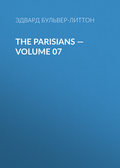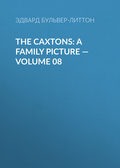
Эдвард Бульвер-Литтон
Kenelm Chillingly — Volume 05
CHAPTER VI
KENELM walked into the shop kept by the Somerses, and found Jessie still at the counter. "Give me back my knap sack. Thank you," he said, flinging the knapsack across his shoulders. "Now, do me a favour. A portmanteau of mine ought to be at the station. Send for it, and keep it till I give further directions. I think of going to Oxford for a day or two. Mrs. Somers, one more word with you. Think, answer frankly, are you, as you said this morning, thoroughly happy, and yet married to the man you loved?"
"Oh, so happy!"
"And wish for nothing beyond? Do not wish Will to be other than he is?"
"God forbid! You frighten me, sir."
"Frighten you! Be it so. Everyone who is happy should be frightened lest happiness fly away. Do your best to chain it, and you will, for you attach Duty to Happiness; and," muttered Kenelm, as he turned from the shop, "Duty is sometimes not a rose-coloured tie, but a heavy iron-hued clog."
He strode on through the street towards the sign-post with "To Oxford" inscribed thereon. And whether he spoke literally of the knapsack, or metaphorically of duty, he murmured, as he strode,—
"A pedlar's pack that bows the bearer down."
CHAPTER VII
KENELM might have reached Oxford that night, for he was a rapid and untirable pedestrian; but he halted a little after the moon rose, and laid himself down to rest beneath a new-mown haystack, not very far from the high road.
He did not sleep. Meditatingly propped on his elbow, he said to himself,—
"It is long since I have wondered at nothing. I wonder now: can this be love,—really love,—unmistakably love? Pooh! it is impossible; the very last person in the world to be in love with. Let us reason upon it,—you, myself, and I. To begin with,—face! What is face? In a few years the most beautiful face may be very plain. Take the Venus at Florence. Animate her; see her ten years after; a chignon, front teeth (blue or artificially white), mottled complexion, double chin,—all that sort of plump prettiness goes into double chin. Face, bah! What man of sense—what pupil of Welby, the realist—can fall in love with a face? and even if I were simpleton enough to do so, pretty faces are as common as daisies. Cecilia Travers has more regular features; Jessie Wiles a richer colouring. I was not in love with them,—not a bit of it. Myself, you have nothing to say there. Well, then, mind? Talk of mind, indeed! a creature whose favourite companionship is that of butterflies, and who tells me that butterflies are the souls of infants unbaptized. What an article for 'The Londoner,' on the culture of young women! What a girl for Miss Garrett and Miss Emily Faithfull! Put aside Mind as we have done Face. What rests?—the Frenchman's ideal of happy marriage? congenial circumstance of birth, fortune, tastes, habits. Worse still. Myself, answer honestly, are you not floored?"
Whereon "Myself" took up the parable and answered, "O thou fool! why wert thou so ineffably blessed in one presence? Why, in quitting that presence, did Duty become so grim? Why dost thou address to me those inept pedantic questionings, under the light of yon moon, which has suddenly ceased to be to thy thoughts an astronomical body and has become, forever and forever, identified in thy heart's dreams with romance and poesy and first love? Why, instead of gazing on that uncomfortable orb, art thou not quickening thy steps towards a cozy inn and a good supper at Oxford? Kenelm, my friend, thou art in for it. No disguising the fact: thou art in love!"
"I'll be hanged if I am," said the Second in the Dualism of Kenelm's mind; and therewith he shifted his knapsack into a pillow, turned his eyes from the moon, and still could not sleep. The face of Lily still haunted his eyes; the voice of Lily still rang in his ears.
Oh, my reader! dost thou here ask me to tell thee what Lily was like?—was she dark? was she fair? was she tall? was she short? Never shalt thou learn these secrets from me. Imagine to thyself the being to which thine whole of life, body and mind and soul, moved irresistibly as the needle to the pole. Let her be tall or short, dark or fair, she is that which out of all womankind has suddenly become the one woman for thee. Fortunate art thou, my reader, if thou chance to have heard the popular song of "My Queen" sung by the one lady who alone can sing it with expression worthy the verse of the poetess and the music of the composition, by the sister of the exquisite songstress. But if thou hast not heard the verse thus sung, to an accompaniment thus composed, still the words themselves are, or ought to be, familiar to thee, if thou art, as I take for granted, a lover of the true lyrical muse. Recall then the words supposed to be uttered by him who knows himself destined to do homage to one he has not yet beheld:—
"She is standing somewhere,—she I shall honour,
She that I wait for, my queen, my queen;
Whether her hair be golden or raven,
Whether her eyes be hazel or blue,
I know not now, it will be engraven
Some day hence as my loveliest hue.
She may be humble or proud, my lady,
Or that sweet calm which is just between;
But whenever she comes, she will find me ready
To do her homage, my queen, my queen."
Was it possible that the cruel boy-god "who sharpens his arrows on the whetstone of the human heart" had found the moment to avenge himself for the neglect of his altars and the scorn of his power? Must that redoubted knight-errant, the hero of this tale, despite the Three Fishes on his charmed shield, at last veil the crest and bow the knee, and murmur to himself, "She has come, my queen"?
CHAPTER VIII
THE next morning Kenelm arrived at Oxford,—"Verum secretumque Mouseion."
If there be a place in this busy island which may distract the passion of youth from love to scholarship, to Ritualism, to mediaeval associations, to that sort of poetical sentiment or poetical fanaticism which a Mivers and a Welby and an advocate of the Realistic School would hold in contempt,—certainly that place is Oxford,—home; nevertheless, of great thinkers and great actors in the practical world.
The vacation had not yet commenced, but the commencement was near at hand. Kenelm thought he could recognize the leading men by their slower walk and more abstracted expression of countenance. Among the Fellows was the eminent author of that book which had so powerfully fascinated the earlier adolescence of Kenelm Chillingly, and who had himself been subject to the fascination of a yet stronger spirit. The Rev. Decimus Roach had been ever an intense and reverent admirer of John Henry Newman,—an admirer, I mean, of the pure and lofty character of the man, quite apart from sympathy with his doctrines. But although Roach remained an unconverted Protestant of orthodox, if High Church, creed, yet there was one tenet he did hold in common with the author of the "Apologia." He ranked celibacy among the virtues most dear to Heaven. In that eloquent treatise, "The Approach to the Angels," he not only maintained that the state of single blessedness was strictly incumbent on every member of a Christian priesthood, but to be commended to the adoption of every conscientious layman.
It was the desire to confer with this eminent theologian that had induced Kenelm to direct his steps to Oxford.
Mr. Roach was a friend of Welby, at whose house, when a pupil, Kenelm had once or twice met him, and been even more charmed by his conversation than by his treatise.
Kenelm called on Mr. Roach, who received him very graciously, and, not being a tutor or examiner, placed his time at Kenelm's disposal; took him the round of the colleges and the Bodleian; invited him to dine in his college-hall; and after dinner led him into his own rooms, and gave him an excellent bottle of Chateau Margeaux.
Mr. Roach was somewhere about fifty,—a good-looking man and evidently thought himself so; for he wore his hair long behind and parted in the middle, which is not done by men who form modest estimates of their personal appearance.
Kenelm was not long in drawing out his host on the subject to which that profound thinker had devoted so much meditation.
"I can scarcely convey to you," said Kenelm, "the intense admiration with which I have studied your noble work, 'Approach to the Angels.' It produced a great effect on me in the age between boyhood and youth. But of late some doubts on the universal application of your doctrine have crept into my mind."
"Ay, indeed?" said Mr. Roach, with an expression of interest in his face.
"And I come to you for their solution."
Mr. Roach turned away his head, and pushed the bottle to Kenelm.
"I am quite willing to concede," resumed the heir of the Chillinglys, "that a priesthood should stand apart from the distracting cares of a family, and pure from all carnal affections."
"Hem, hem," grunted Mr. Roach, taking his knee on his lap and caressing it.
"I go further," continued Kenelm, "and supposing with you that the Confessional has all the importance, whether in its monitory or its cheering effects upon repentant sinners, which is attached to it by the Roman Catholics, and that it ought to be no less cultivated by the Reformed Church, it seems to me essential that the Confessor should have no better half to whom it can be even suspected he may, in an unguarded moment, hint at the frailties of one of her female acquaintances."
"I pushed that argument too far," murmured Roach.
"Not a bit of it. Celibacy in the Confessor stands or falls with the Confessional. Your argument there is as sound as a bell. But when it comes to the layman, I think I detect a difference."
Mr. Roach shook his head, and replied stoutly, "No; if celibacy be incumbent on the one, it is equally incumbent on the other. I say 'if.'"
"Permit me to deny that assertion. Do not fear that I shall insult your understanding by the popular platitude; namely, that if celibacy were universal, in a very few years the human race would be extinct. As you have justly observed, in answer to that fallacy, 'It is the duty of each human soul to strive towards the highest perfection of the spiritual state for itself, and leave the fate of the human race to the care of the Creator.' If celibacy be necessary to spiritual perfection, how do we know but that it may be the purpose and decree of the All Wise that the human race, having attained to that perfection, should disappear from earth? Universal celibacy would thus be the euthanasia of mankind. On the other hand, if the Creator decided that the human race, having culminated to this crowning but barren flower of perfection, should nevertheless continue to increase and multiply upon earth, have you not victoriously exclaimed, 'Presumptuous mortal! how canst thou presume to limit the resources of the Almighty? Would it not be easy for Him to continue some other mode, unexposed to trouble and sin and passion, as in the nuptials of the vegetable world, by which the generations will be renewed? Can we suppose that the angels—the immortal companies of heaven—are not hourly increasing in number, and extending their population throughout infinity? and yet in heaven there is no marrying nor giving in marriage.' All this, clothed by you in words which my memory only serves me to quote imperfectly,—all this I unhesitatingly concede."






